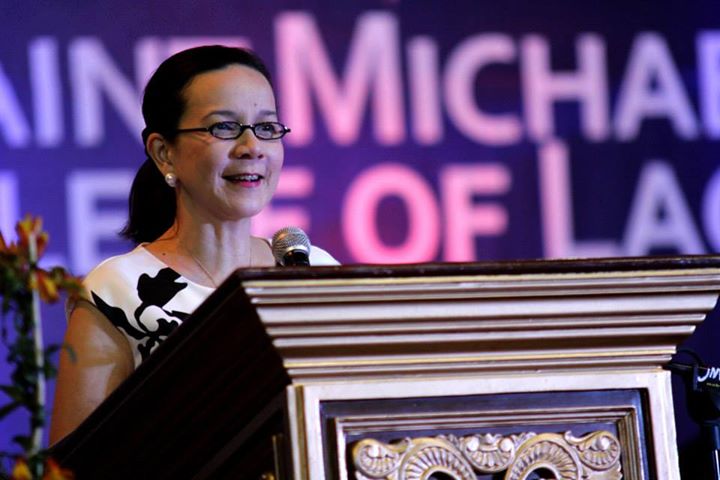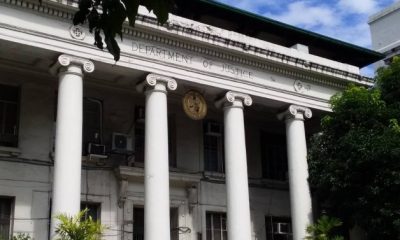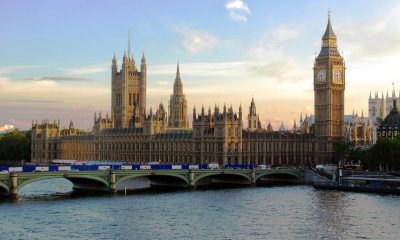Headline
SET asks SC to junk David’s petition vs. Sen. Grace Poe

Senator Grace Poe (Photo from Poe’s official Facebook page)
MANILA—The Senate Electoral Tribunal (SET) on Monday asked the Supreme Court (SC) to dismiss the petition filed by Rizalito David against Senator Grace Poe-Llamanzares over citizenship issue.
The Office of the Solicitor General (OSG) filed its comment before the SC in connection with the petition of David questioning the decision of the SET ruling that Poe is a natural-born Filipino citizen.
The OSG represented the SET, who is the respondent in the case.
In a 28-page comment signed by Solicitor General Florin T. Hilbay, the OSG argued that the SET did not commit grave abuse of discretion when it upheld Poe’s natural-born Filipino citizen status.
The OSG said that even without specific recognition, foundlings like Sen. Poe are natural-born under the 1935 Constitution, which was the prevailing Constitution when Poe was born in 1968.
As a legal basis, the SET cited part of the deliberation of the 1934 Constitutional Convention stating the intention to include the foundlings or the children who had “unknown parentage”, who should be considered as Philippine citizens.
In the said deliberation, the SET said it appeared that it need not mention particularly in the Constitution the children who had “unknown parents” because under the international law, they are considered as citizens of the Philippines.
Because of this, the SET added that it appeared that the silence of the 1935 Constitution on the citizenship of the foundlings should not be read in the manner that is “excluded” or not considered as citizens of the Philippines.
The SET further argued that the recognition of the foundlings as citizens of the Philippines under the Constitution is based on the prime principle of justice for the innocent children who were abandoned by their parents.
It added that it appeared that there are two interpretations of the 1935 Constitution, hence, it is just reasonable to favor the more important principles of the Constitution, and this was not to put the foundlings in jeopardy.
The SET also believes that they did not commit grave abuse of discretion when they declared as “valid” the reacquisition by Poe of her natural-born citizenship under Republic Act No. 9225, or the “Citizenship and Retention and Reacquisition Act of 2003”.
It added that this was also based on the pieces of evidence submitted by Poe such as the “Oath of Allegiance to the Republic of the Philippines”, filing of the petition for the reacquisition of Philippine Citizenship before the Bureau of Immigration (BI) and the order of the BI in favor of her petition.
Because of this, the SET asked the SC to dismiss the petition of David. (PNA)






















Tata E.
January 4, 2016 at 11:04 AM
Can a Foundling be a Natural-Born Citizen? (Arguments on the
Citizenship of Grace Poe)
Posted on August 3, 2015 by Atty. P.M. Dizon
In a Philippine election, a candidate will be disqualified if
she is not a Filipino citizen. If she wants to be President or Vice-President,
she also has to be a natural-born Filipino.
When Grace Poe’s citizenship is questioned, she will have to
prove her citizenship, as well as whether she is naturalized or natural-born.
She can only be a natural-born Filipino if she was born to a
Filipino mother or father. There is no other way. But since she does not know
her biological parents, or their citizenship, could she be considered Filipino?
And if she is a Filipino citizen, is she natural-born or naturalized?
A foundling is an abandoned child whose parents or relatives are
unknown. Nobody knows if her biological parents are Filipino. A person who
looks Filipino could be a foreigner – for example, if she was born of a
Malaysian father and an Italian mother. On the other hand, a blonde, blue-eyed
girl can be a natural-born Filipino if she was born to naturalized Caucasian
parents.
Citizenship is governed by only one law – the Philippine
Constitution, (of which there are three versions – the 1935, 1973, and 1987
Constitutions).
Under the 1973 and 1987 Constitutions, those born of Filipino
fathers or mothers are Filipino citizens. But if a person with a Filipino
mother and an alien father was born before January 17, 1973, that person can
only be a Filipino citizen if she elects Philippine citizenship some time upon
reaching the age of majority. If she does not, then she would not be considered
Filipino. (This was because under the 1935 Constitution, which was in effect
before the 1973 Constitution, Filipino citizenship is automatically granted
only to those with Filipino fathers.) If the Filipino mother is unmarried, the
child is automatically Filipino. Lastly, a person can be a Filipino citizen if
she is naturalized by law.
Legal experts have made their opinions on the citizenship of
foundlings. Here are their arguments:
Foundlings cannot be considered citizens unless they prove that
one of their biological parents is Filipino.
Legal principles that the Supreme Court had consistently applied
in a span of decades find application here.
First of all, the Supreme Court ruled that one who claims to be
Filipino must satisfactorily PROVE that she is Filipino, by showing that one of
her biological parents are Filipino.
The Supreme Court declared that there can be no presumption of
Philippine citizenship. That means that if a foundling cannot prove
citizenship, she cannot be considered Filipino.
Secondly, the act of adoption will not confer Filipino
citizenship. If the foundling was adopted by a Filipino citizen, this act will
not confer citizenship on the child.
Thirdly, the Philippine Constitution does not give a presumption
or deem as Filipino those who cannot identify their source of citizenship.
There is a list of persons who are considered citizens. One’s
citizenship can be passed by blood (the principle of jus sanguinis), or one
becomes a naturalized citizen by action of law. These are the only two ways one
can be a citizen.
Many legal experts do not like this position. They feel that it
prejudices foundlings rather harshly. They say that it would have weird
repercussions. They say, for example, that a lot of street kids are foundlings,
and lack documentation of their citizenship. It would be crazy for the State to
consider all of them illegal aliens and try to deport them.
However, this belief is exaggerated.
The Supreme Court was rather strict in its doctrine. Their
decisions indicate that the only time that a person is required to prove her
citizenship is when Filipino citizenship is actually questioned in a proceeding
precisely for that purpose. So, that means that if a foundling was registered
as a Filipino citizen, there would be no question about her citizenship at all
– unless a court case is filed where she must prove it. (Thankfully, the only
court cases that may be filed against them for proving citizenship are election
cases and petitions for certiorari governing immigration cases.)
Why should the foundling be the one to prove her citizenship?
That’s the effect of the Supreme Court’s doctrine that there is no presumption
of citizenship – the one who claims to be Filipino must be the one to prove it.
Foundlings should automatically be considered Filipino citizens.
Those of this opinion feel that the State should exercise some
compassion with regard to foundlings. After all, it is not their fault that
they are foundlings. Instead of making life harder for them, the State, as
Parens Patriae (Latin for “parent of the country”), must have compassion and
should grant them citizenship. Even if they are blond and blue-eyed and very
Caucasian.
The counter-argument to that position is that the Philippines is
a government of laws, not of men. Hence the government should act based on the
laws that govern it, not simply out of compassion, because nobody should be
exempt from the law.
The Supreme Court noted in its decisions that Philippine laws on
citizenship are very restrictive. It is so restrictive that the drafters of our
Constitution even differentiate between natural-born and naturalized. The
Supreme Court has already declared that there is no presumption of citizenship
and that one who claims to be Filipino should prove it. It may be harsh, but
that’s the law.
The second legal basis is based on international law. Some
experts are of the belief that principles of international law require the
Philippines to bestow citizenship on foundlings. Two international laws are of
notable importance.
The 1930 Hague Convention on Certain Questions Relating to the
Conflict of Nationality Law, states in Article 14, “A child whose parents are
both unknown shall have the nationality of the country of birth.” The second is
the 1961 Convention on Reduction of Statelessness. Article 2 of that convention
allows a foundling to be considered to have been born of parents who are
citizens of the contracting state. (Exact words: “A foundling found in the
territory of a Contracting State shall, in the absence of proof to the
contrary, be considered to have been born within the territory of parents
possessing the nationality of that State.”).
There is a big problem with that argument – first of all (and
most importantly), the Philippines is not a signatory to those international
conventions. Those conventions go against the Philippine Constitution (1935,
1973, and 1987) provisions on citizenship. That may be why we never became party
to them.
Those who argue in favor of these conventions say that they are
now considered “customary international law” and by virtue of the
constitutional law principle that “adopts the generally accepted principles of
international law as part of the law of the land,” the Philippines has actually
adopted these two conventions even though it is not signatory thereto. They
believe that these conventions were brought about by international custom and
that, because of the length of time that has passed, these conventions have
ripened into something that one can derive rights from.
Again, there are problems with that. Any law, whether local or
international, which goes against any provision of the Constitution is void.
Since these conventions go against our citizenship provisions, then they cannot
have an effect here.
Also, international customary laws are those aspects of
international law that derive from widespread custom, acceptance, and practice
by States. But these conventions cannot be considered customary international
law because many countries do not accept them. There are few States that have
signed, ratified, and accepted them. Since there is no widespread acceptance of
the principles in these conventions, they cannot be considered international custom.
In any case, both conventions do not require the contracting
State to bestow citizenship conclusively (i.e., permanently) on the foundling.
They allow the state leeway to remove citizenship if it could be shown that the
child’s parents are not citizens.
It is possible to harmonize this with the Supreme Court rulings
of the past decades. A liberal Supreme Court could declare that there is an
international customary law that allows a state to consider foundlings as
citizens. However, if citizenship is questioned, the foundling has the burden
of proving it. This will allow indigents with no citizenship records to vote,
get passports, and not get deported.
NATURAL-BORN OR NATURALIZED?
It gets tricky now.
Let’s assume that the foundling derives Filipino citizenship by
virtue of international law or international customary law, and not by virtue
of blood ties to a Filipino biological parent.
Is a foundling considered natural-born or naturalized citizen?
The Constitution describes two types of citizens. A natural-born
Filipino has more rights than a naturalized Filipino. They are the only ones
who are allowed to hold positions in the highest executive, legislative, and
judicial offices in the country, as well as the constitutional commissions.
This is how restrictive Philippine laws on citizenship are. (It
is so hard to become a naturalized citizen that I actually think naturalized
citizens love our country more because of the hassle they take to become a
citizen, the huge investment, and the fact that they have greater stake in the
country than most natural-born citizens.)
The Philippine Constitution defines a naturalized Filipino as
one who became Filipino in accordance with law.
So, if a foundling derives her Filipino citizenship by virtue of
international law, then she becomes a Filipino citizen by virtue of law! This
makes her a naturalized Filipino citizen.
The constitution states that a natural-born Filipino is one who
is a citizen from birth without having to perform any act to acquire or perfect
the citizenship. One may argue that a child did not do anything to acquire or
perfect citizenship, so she should be considered natural-born.
That’s a bad argument when you see it in the context of Supreme
Court rulings.
In the first place, the Supreme Court has ruled that children of
foreign nationals who are naturalized are also naturalized Filipinos even
though they did not perform any act to acquire citizenship. They are not
considered natural-born even when they did not do a thing to obtain their new
nationality. They were naturalized in accordance with law. (Note that if the
children were born AFTER their parents were naturalized, then they are
considered natural-born).
In the second place, under the 1987 Constitution, international
law forms part of the laws of the land. However, it does not form part of the
Constitution, so that means that international law will not add new
qualifications for Filipino citizenship. However, it is considered same level
and effect as a law passed by the Legislature.
If these conventions would be considered laws that bestow
nationality on foundlings, then any who derive their Filipino citizenship in
accordance with them are citizens who were naturalized in accordance with law.
Since the only way to be a natural-born citizen is to have
Filipino parents, then foundlings can only be considered natural-born citizens
if they can adduce evidence showing that their biological parents are
Filipinos.
That’s it. Those are the
arguments. Now, we wait until a case is brought, and we’ll see how the Supreme
Court would rule..